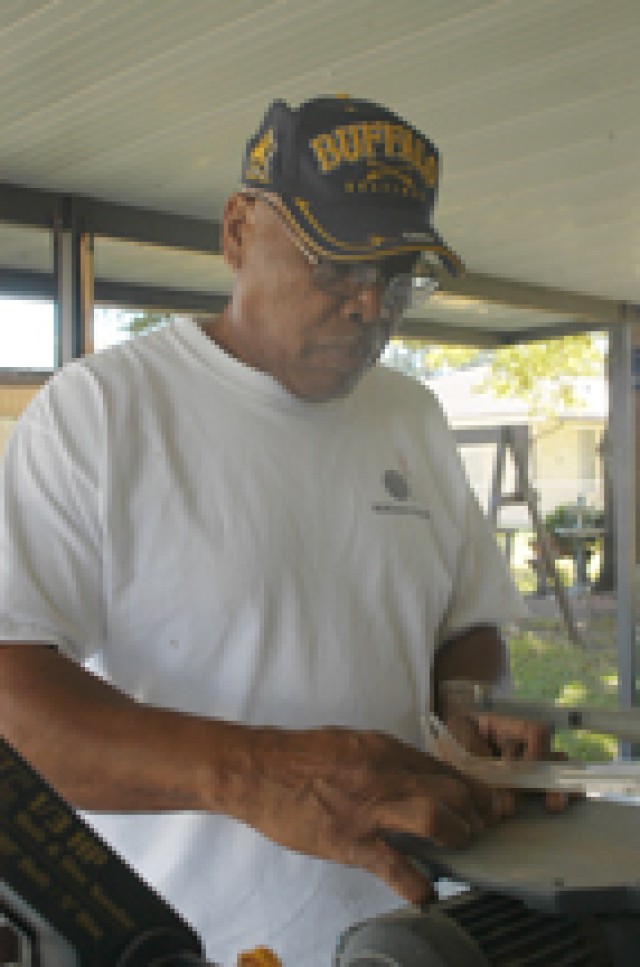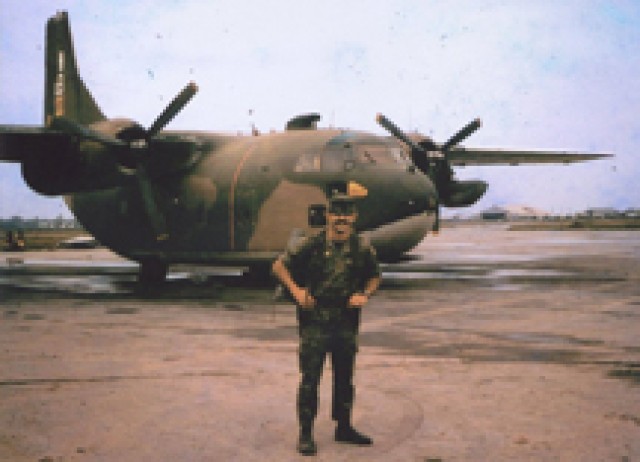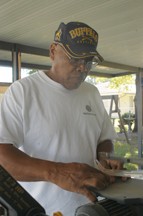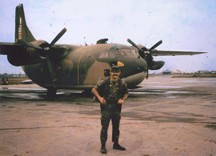FORT POLK, La. -- An old Soldier relives the same scene every day: In the muddy, humid jungle on a far-flung battlefield, he turns just in time to see his buddy take a bullet. Each day he watches his friend die. Every day, moments of comfort are at risk of being invaded by a memory: The stench of death, the discomfort of never being clean or dry, and the constant terror (pushed to the back of the mind) that this may be the day he gets hit with shrapnel or dies by a sniper's bullet.
It may be easy to pass the grey-haired man and think "hurry up old man, I've got somewhere to be, and you're slowing me down." There might be a wealth of experience -- and sacrifice -- under a wrinkled brow, though. Movies like "Saving Private Ryan," and TV series like "The Pacific" can be eye opening for people who have not experienced the stress of combat -- often veterans come home and live with the constant memory of things their Families and neighbors might never understand.
This week, as Fort Polk prepares for Saturday's Retiree Appreciation Day, some local retired combat veterans shared their experiences -- stories of horror and death that are inescapable for them, but unapparent to the casual bystander. Four veterans of the Vietnam War were interviewed for this story, but their recollections of combat are similar to those of many veterans of World War II, Korea and America's current conflicts. They share a common experience -- living on the knife's edge between life and death in service to their country. But if any of them are asked, they will easily admit that the first thing on their minds at those bloody moments was the well-being of their friends to the right and left -- politics and patriotic rhetoric were far from their minds. There was a job to do, and these men did it well.
Joe McKee is on the Leesville, La., City Council and works in a local real estate office. He deployed to Vietnam in 1966 as an advisor to the South Vietnamese army in the Mekong Delta. "Skirmishes were harrowing because bullets were flying everywhere," he said. "I never got hit though." McKee, who was a captain, and two noncommissioned officers were the only Americans in a South Vietnamese battalion. "One day we were walking along a canal," he recounted. "I was near the back of the column with one of my sergeants in front of me and my interpreter behind me. I heard an explosion behind me -- my interpreter had stepped on an anti-personnel mine. Most of the battalion had already walked along that path. His leg was shattered and the man in front of me got hit with shrapnel (McKee didn't suffer a scratch). Just then a C.I.A. chopper was flying over. We had codes to talk to them so we called and the pilot landed right there and evacuated the interpreter. One month later, the interpreter found me. He was walking with a cane, and wanted to shake my hand. It was great to see him walking."
McKee recalled other near-miss moments during his deployment to Vietnam.
"One time we were on an operation and stopped for a rest. Our Cambodian radio operator stayed close to me because I had direct communication with American firepower. He was 17 years old and very devoted to us. He left the radio with me and walked a few feet away and a Viet Cong guerilla popped out of a hole and shot him between the eyes. The Vietnamese soldiers took care of the VC immediately. That was close to me -- it woke me up. That VC used an American M1 carbine. (Another time,) I was in my hammock and a mortar round went off on my left. Then one exploded on the right. I got my radio and ran. The next round didn't land directly where I was, but it was close."
Retired Col. Rusty Bailes was born and raised in Leesville and currently operates a farm north of town. He deployed to Vietnam in 1967 with the 3rd Marine Division. His unit operated in the northern area of operations and fought through the 1968 Tet Offensive and helped relieve the besieged Marines at Khe Sanh. "I was an engineer," Bailes said. "Our job was to ensure the mobility of the infantry. We kept the roads open, constructed fortifications and cleared minefields. It's hard to explain to a person who has never gone through the rigors of combat what it's really like. I had an uncle who was a prisoner of war in World War II and one who was an infantry captain. They never talked about their war experiences with their brothers and children, but they would sit and talk with me. It is a common bond that one war vet has with another.
"After Khe Sanh, we were clearing a road and I saw a Chinese-made grenade laying by the road. I called the column to a halt and brought the lieutenant from the lead platoon back to show him. I chewed him out for not noticing it. My radio operator realized we were standing in an ambush. I looked around and there were Chinese claymore-type mines all around us. Then the lead platoon became engaged with the enemy across the river. We jumped into a ditch and called in mortars. I heard one of the rounds fall short, close to our position. I had the radio operator tell them to adjust, and on the next volley one round landed closer to me. On the next volley I realized the enemy was masking their fire with ours, and they knew where I was. I heard that next round leave the tube. When it landed it was close enough I could touch the fins. It went into some mud and didn't go off. They would have wiped out the entire command."
Retired Master Sgt. Bart Welter lives in Shreveport and served as a medic in Vietnam with the 101st Airborne Division in 1965 and supervised a field hospital emergency room in Saigon in 1971. "On my first tour, we were on a search and destroy mission -- we would go out and look for the enemy and they were never there," Welter said. "We never got clean and we never felt safe. We only lost two Soldiers in my first tour, but my unit was close-knit, which made it harder when someone died.
"Patrols were stressful. We would walk in the footsteps of the person in front of us. On one patrol, a friend of mine, Mark Hughes, was in front of me and stepped on a buried mine. It could easily have been me. It blew me back and killed hree people. I sat down with a buddy not long ago and we figured, with six tours between us, that we knew about 200 people whose names are on the Vietnam memorial."
Retired Command Sgt. Maj. Grady Thomas lives in New Llano and is active in the Military Order of the Purple Heart. He deployed with the 101st Airborne Division to Vietnam in 1967. "During the Tet Offensive, I was a platoon sergeant and saw another platoon sergeant get killed by a sniper," Thomas said. "Five or six guys in his platoon were also killed. Death has a stench -- it is a different smell. It was always combined with the smell of gunpowder and I remember going to the rifle range 20 years later and the smell of gunpowder brought back memories.
"After Tet, my company was on patrol and we came in contact with a bunker complex. As we formed a perimeter, the enemy was firing mortars into our position. There was an explosion behind me and I was stunned. I reached behind me for the radio handset from the radio operator. He said he was hit. This was his first mission. There was another explosion above me, and a piece of shrapnel hit me in the ankle. When the bullets are flying, it seems like forever. I had a small waist and my pistol belt was too big so I had to triple it. When I got hit from behind, shrapnel cut through all three straps of the pistol belt and cut my back. I had so much adrenaline going I didn't realize my back was worse than my leg. If I hadn't triple layered the belt I would have been crippled."
After recuperating from his wounds, Thomas rejoined the unit the next month. "We were on patrol not long after that when two more Soldiers in my platoon were killed. That really hurt me, because they deployed with us originally and I had known them at Fort Campbell, Ky., before we deployed. One of them had a wife and baby back home. His wife was pregnant when we deployed, and he never got to see his baby."
Like many veterans, these men are interested in helping their young counterparts who have served on the battlefields of Iraq and Afghanistan. "I try to spend time on Fort Polk playing golf, where I meet Soldiers who have come back from deployments," McKee said. "I just spend time with them and have fun. Some of them tell their stories. I kept myself occupied when I got home -- I could have dwelled on the painful experiences, but I have been blessed to be here and I try to give any help I can."
"I made a vow that as long as I am alive, whenever I see an American service member that I would thank him," said Bailes. "I have a kinship with young Soldiers and Marines. I've been there, I know what it is, I know their mindset. This is our job: We close with, and destroy the enemy."
"Soldiers today are dealing with booby traps like we were," Welter said. His advice for Soldiers today: "Believe in the Army medical system. I know it works. The mantra in the medical community has always been 'If we can get to you, we will take care of you.'"
Although most Americans have become conscious of post traumatic stress disorder because of the current conflicts, these Vietnam veterans also deal with the effects of their battlefield experiences. There are a host of Soldiers from past wars who have pushed through the debilitation and can provide support. "When I got home, I had trouble with loud noises and I wouldn't sit with my back to the door," Welter said. "To this day, when I walk in a room I look for the exits. I didn't sleep well for a long time. I had night sweats, was angry and didn't trust anyone."
"PTSD is real," Bailes said. "Today's young warriors can get through it. Coming home from combat was a drastic change. Loud noises still bothered me, I looked for ambushes. The Soldiers dealing with PTSD have to believe they can get over it and they have to get help -- they need someone to talk to. I think it's better if they can find someone who has had similar experiences. Trying to maintain family relationships with all of this going on is tough."
Warriors often deal with self-imposed guilt when they return home because some of their friends didn't make it. "Why did I make it home and my buddy Andy Anderson didn't'" Bailes asks himself. "I think he was a better person than I was. He was the kind of guy you want your daughter to marry -- the guy you want as your best friend forever. He had a horrible death. He was shot in the gut and they couldn't do anything for him. What a waste."
Bailes has advice for warriors who are dealing with PTSD: "The suicide rate causes me more concern than anything else. Go to your happiest place in your mind. Count your blessings, focus on your abilities and the times you have been happy. Even in my dark times I had to sit back and evaluate myself. A young Soldier may have three deployments to Iraq and had good friends killed.
"Some have been severely mangled and wounded for life. He is wondering when his time will come. I had the same thoughts, but I put them out of my mind. I could not think those thoughts and still do what I had to do. Think about the bond you have with your brothers in arms."
These veterans all said the real heroes are the ones who didn't make it home. They were careful to tell their stories because they didn't want to take glory. While Soldiers who are serving today can learn lessons from these warriors who have gone ahead of them, every American who has never served in combat can also gain an appreciation of the rigors and heart-wrenching stress of the battlefield. These men claim not to be heroes, but for those who benefit from their sacrifice, that is exactly what they are.




Social Sharing